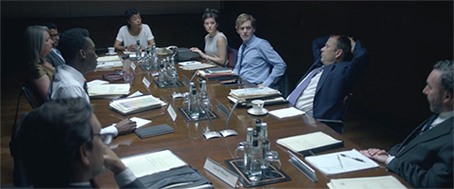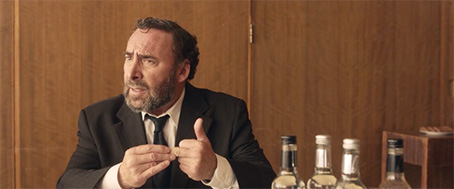|
A group of eight specially selected civil servants, plus one government minister who's subbing for a sick leave absentee, gather in a Whitehall conference room to participate in a three day exercise to explore what measures the British government might take at a time of potential nuclear conflict. All are given real world governmental roles to play and have come prepared with detailed knowledge of their assigned areas, but have no foreknowledge of what the crisis will be. The group is overseen by the authoritative Philippa, and appears to be deliberately varied in its make-up. The only one not contributing to the debate is Kate, whose role is to outline each day's scenario and record the content of the resulting discussions. When the scenario is outlined – an extremist group thought to be funded by the Pakistani government has exploded a nuclear device on Indian soil – there is initial agreement on the precautionary measures that the government should take. But as the theoretical situation worsens, the decisions required become more difficult to make and ideological and personal issues bring members of the group into conflict with each other.
The title War Book is taken from a document authored during the cold war that outlined government plans in the event of nuclear attack, itself the result of numerous war game scenarios played out during the period, presumably in a similar fashion to the one depicted here. The question that's only indirectly posed within the confines of the drama is why in 2014 the decision has been made to revive the process. Yes, why indeed?

Anyone coughing up the funds for a feature that takes place almost exclusively in a single room and is effectively all talk has got to have a lot of faith in the script, and that was clearly the case here. Written by Jack Thorne, whose previous credits include TV favourites Skins and This is England '86, it's a tightly constructed screenplay, thrusting the film ever forward and littered with neatly crafted character detail and eye-opening examples of what we can assume are the results of detailed research. Many of these flit by in little more than a heartbeat but still very impale themselves in your brain, from the suggestion that if we were to shut our borders we would quickly run out of essential medication, to the idea that there is an official definition of what constitutes a major artwork, drawn up to help specify which will be moved to a safe location at a time of war.
With such a strong foundation, an excellent cast is able to quickly create a diverse and well defined collection of characters, enabling Thorne and director Tom Harper (with whom Thorne worked on The Scouting Book for Boys and This is England '86) to explore the dilemma facing the group from a number of viewpoints and create believable verbal conflict from the result. Initially my sympathies lay with the hesitant David (a wonderfully nuanced Anthony Sher), but over time I found myself very much siding with Tom (passionately played by Shaun Evans), the group's voice on conscience when theoretical events take a serious turn. This is particularly true of his run-ins with Gary (a superb Ben Chaplin), a spectacularly self-opinionated arse of the first order who nonetheless handles his assigned role as Prime Minster as if born to it. As the frosty Maria, Kerry Fox has more than a whiff of Theresa May at her most self-righteously unpleasant about her, and while initially little more than a background character, as note taker Kate, Phoebe Fox really gets her chance to shine in the later stages. Misfits star Nathan Stewart-Jarrett walks a neat line in his portrayal of the younger Austin as an inexperienced freshman whose confidence grows when handed a little responsibility, and Adeel Akhtar remains teasingly inscrutable as Indian born delegate Mo. The only character I remained unsure of was the ministerial James (an admittedly well cast Nicholas Burns), whose pompous sense of self-importance, mockery of others and bluff claims to know next to nothing about that social media thing brought the character dangerously close to parody. That said, his introduction is one of the most telling moments in the film, as he's framed make him look twice as big as people he doubtles regards as his inferiors, and they all stand respectfully on his arrival and adopt subconsciously subservient poses.

Its fixed cast and one-room location (there are a couple of brief trips outside) have seen comparisons made to Sidney Lumet's 1957 12 Angry Men, which is a little unfair given that Lumet's film is an acknowledge masterpiece (it's one of only a handful of films I would label as perfect) and that War Book lacks that film's startling twists and thrillingly structured narrative. A better comparison might be with writer Loring Mandel and director Frank Pierson's 2001 HBO drama Conspiracy, which recreated the fateful meeting at which the fate of six million Jews was coldly discussed and decided, another gripping and impeccable performed work confined largely to one room and devoid of plot twists and startling revelations.
If the character interplay keeps the drama on the boil, the frightening but somehow believable speed with which group move from being concerned observers to being ready to launch a potentially apocalyptic nuclear assault infuses the proceedings with an increasing air of fatalistic dread. Thorne and Harper's masterstroke, however, is what you might expect to be its Achilles heel – the decision not to have this all play out not as a real event but an academic exercise. This allows for behaviour and dialogue that might stretch credibility were we asked to believe these were actual politicians at a time of genuine international crisis, and more plausibly allows the private lives and personal prejudices of the characters to colour their responses. It also later gives rise to what turns out to be an important scene, when Gary and Kate enter the conference room alone and take their earlier small flirtations a few steps further. Though initially feeling a little incongruous, it's well written and performed enough to keep you on board, and towards its conclusion Gary lets something slip that completely changes how we view and interpret the rest of the film, a neatly handled twist that would not have been possible had the emergency under examination been for real.
I failed to be persuaded by David's final speech – though I'm still not certain whether it was designed to sway the audience or just the members of the assembled group – and the claim that legal hoops have to be jumped through to track people's usage of Facebook and the like have since been shown by the Edward Snowden revelations to be wishful thinking. But this matters not. War Book is a compelling and thought-provoking demonstration of just what you can achieve with a small group of people in a single location if your script, direction and performances are this accomplished, and for my money is one of the best British films of the year so far.
War Book will be released in UK cinemas this weekend (7th, 8th and 9th August) for a series of one off event and discussion screenings before airing on BBC 4 on Monday August 11.
|